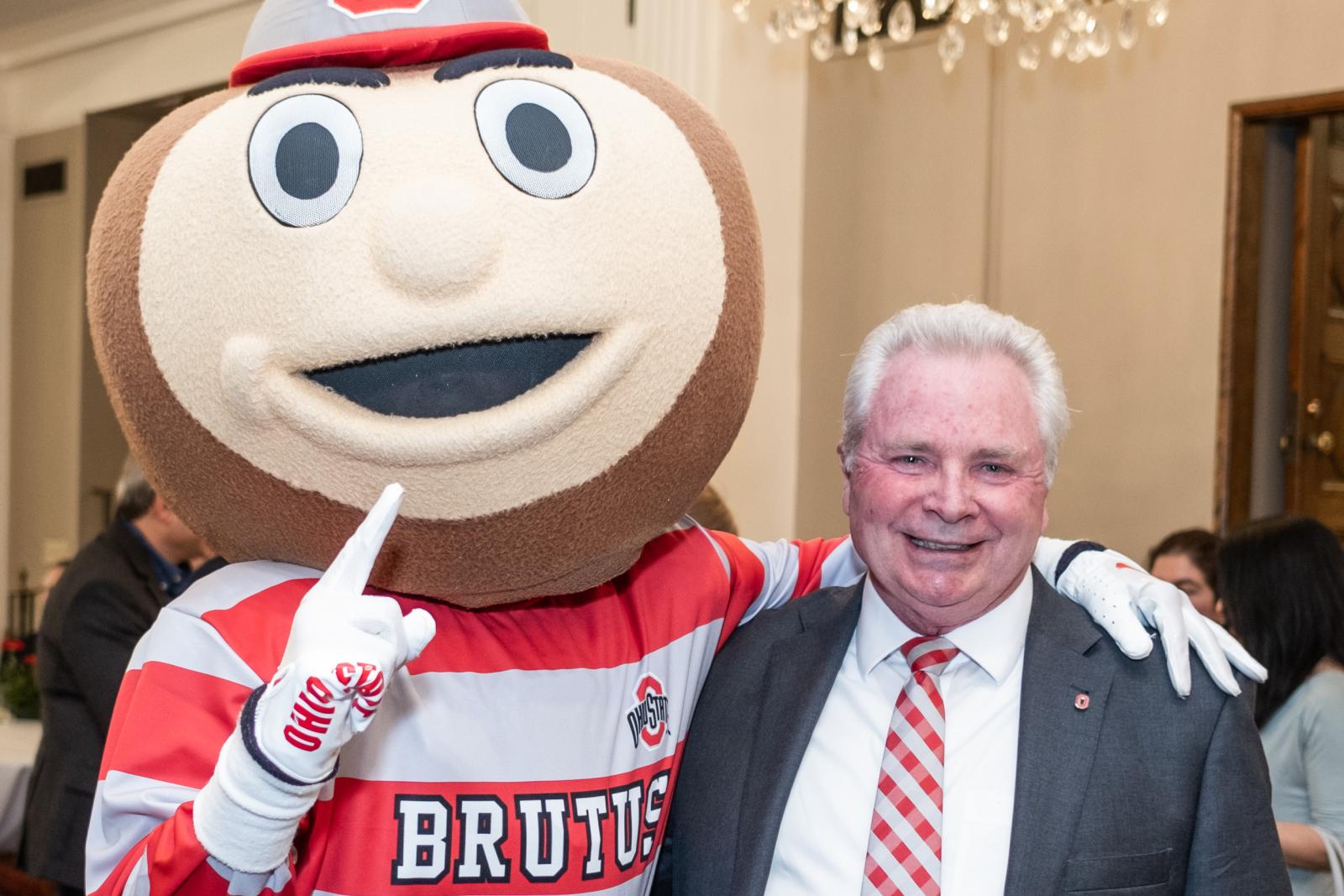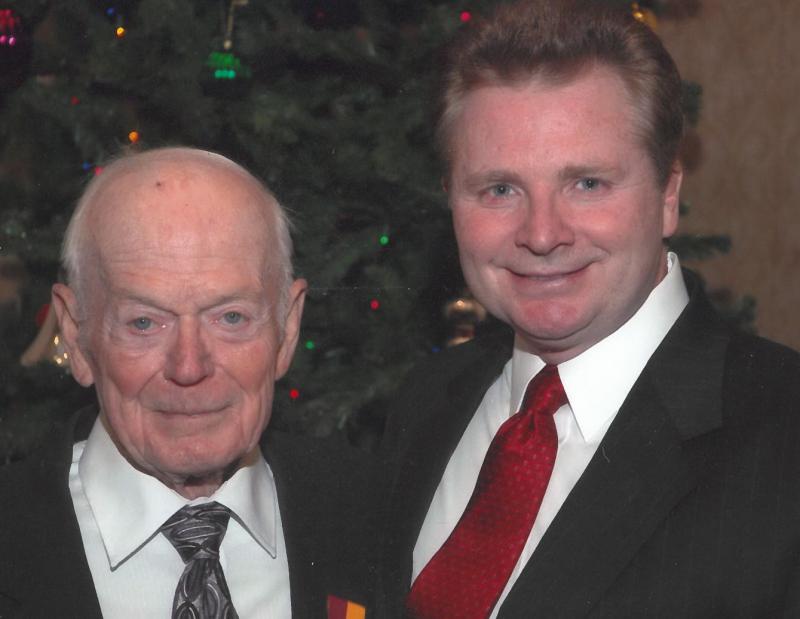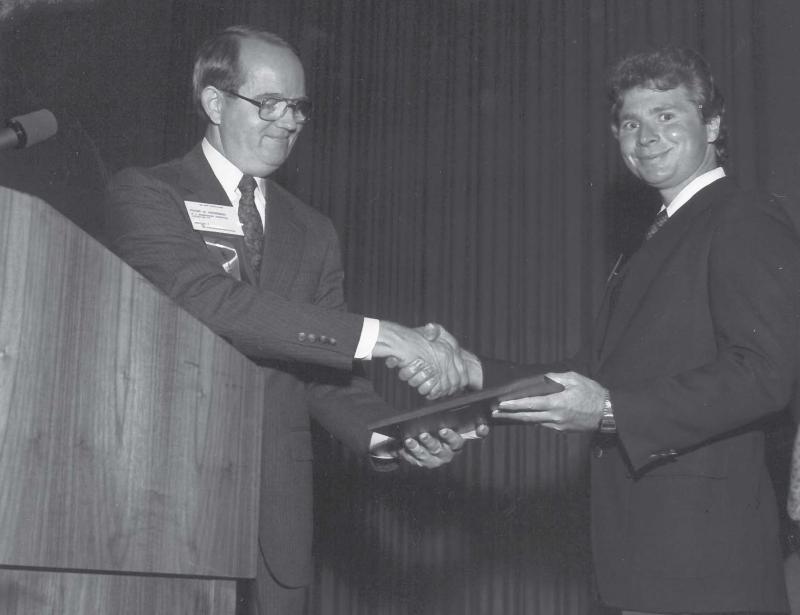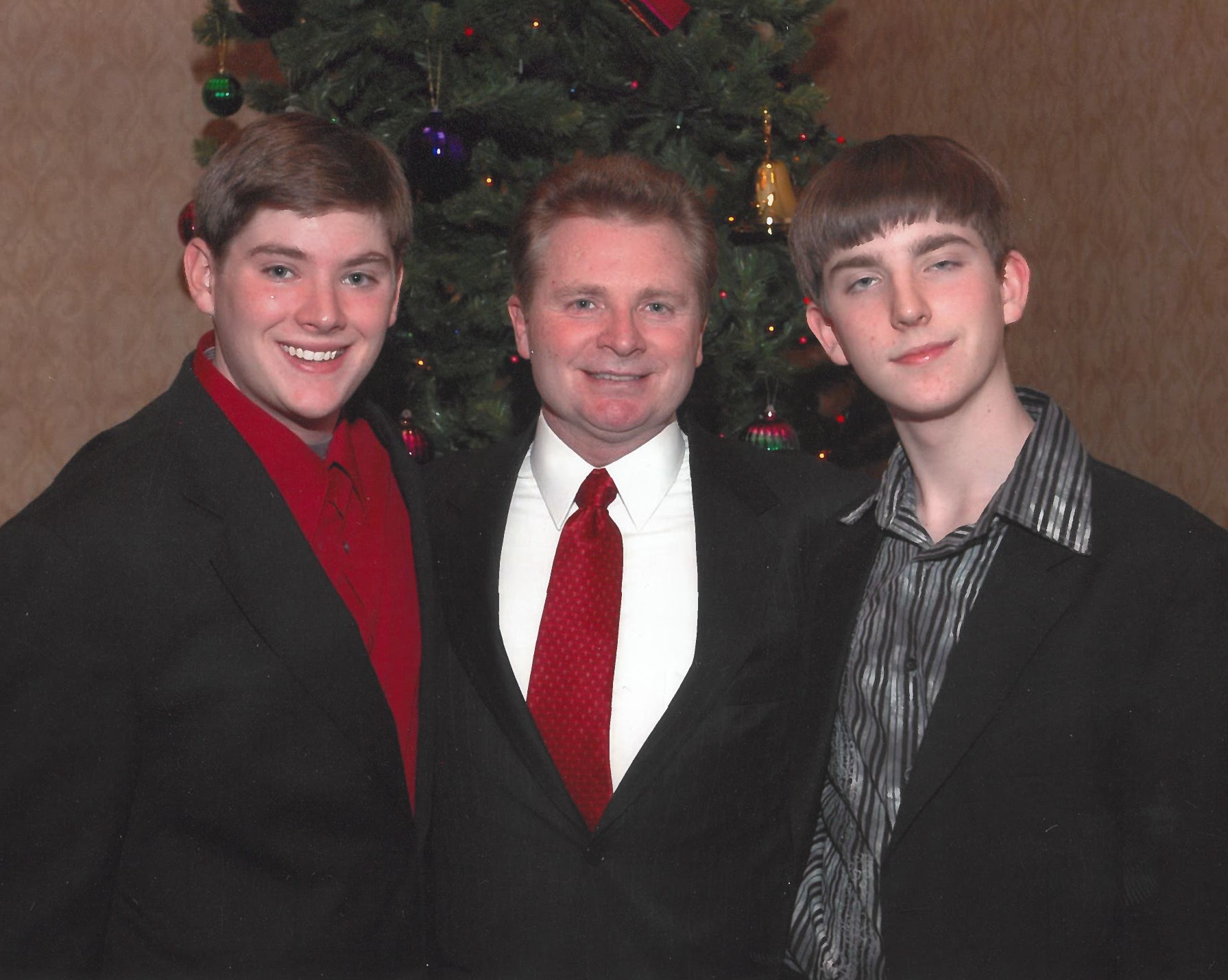A look back: Henry Mann reflects on his career from pharmacist to dean of the College of Pharmacy

“I can’t tell you how wonderful it has been to serve the last 10 years in this position. Nothing has been better than being the dean of the Ohio State College of Pharmacy.”
It was at age 16, while working at a SuperX Drug Store in Louisville, Kentucky, that Henry J. Mann knew he wanted to be in health care.
“Seeing the pharmacist help patients with their medications affected me and my future career tremendously,” said Henry J. Mann, PharmD, FCCP, FCCM, FASHP, dean of The Ohio State University College of Pharmacy. “It was during this time that I got excited about the pharmacist’s role in health care delivery.”
That excitement would fuel his career from pharmacy practice to academia, culminating in his role as the 8th dean of the Ohio State College of Pharmacy – a position he stepped down from at the end of August 2023.
The journey begins
Dean Mann began building his extensive resume in pharmacy four years after working at SuperX Drug. In 1974, he was admitted to the undergraduate pharmacy program at the University of Kentucky (UK). In his final year of the program, he completed clinical clerkships and experiential education in hospital and community practices, inspiring him to matriculate into a combined three-year Doctor of Pharmacy and residency program at UK.
Taking what he learned from the residency program, Dean Mann accepted a job offer in 1980 from the University of Minnesota (UM). At UM, he was tasked with developing pharmacy clinical services for surgery and surgical critical care while also serving as the educational director for UM’s hospital pharmacy department. As Dean Mann progressed through the ranks at the College of Pharmacy, he also took on administrative duties and increased research responsibilities.
In 1999, in addition to being an associate dean for professional and external relations and for clinical affairs, he led the launch of the Center for Excellence in Critical Care, which was one of five university centers at the time, and he became its first director.
“I took a lot of pride in that because the center was an early interprofessional program consisting of nursing, surgery, medicine, pediatrics and pharmacy. One of the center’s outcomes was the development of a critical care research consortium called the Partnership for Excellence in Critical Care in 2002,” Dean Mann said. “The Partnership for Excellence consisted of 17 critical care units across the country, whose directors were all leaders in critical care. Most of the members were physicians and it was unique at the time that a pharmacist founded and led such a research consortium. I am incredibly proud of both the center and the partnership. I learned so much from working with these national leaders and I still miss the camaraderie we shared.”
In 2009, Dean Mann left Minnesota to become the dean of the University of Toronto (UT) College of Pharmacy. UT wanted to convert their undergraduate pharmacy program into a Doctor of Pharmacy (PharmD) program. This required a tremendous amount of change since the school had around 240 students per class and the PharmD degree wasn’t common in Canada.
“A lot of changes had to be done to the health care system in terms of accepting students trained at the PharmD level and getting faculty who could teach that number of students in a PharmD-level curriculum,” Dean Mann said.
In early 2013, the conversion was approved by the Government of Ontario and UT became the first English-speaking school in Canada to establish an entry-level PharmD program.
The timing was perfect as the Ohio State College of Pharmacy was searching for a new dean at that time and Dean Mann was selected.
Strengthening relationships at Ohio State
Much of Dean Mann’s tenure at Ohio State has focused on fostering important partnerships with the Ohio State Wexner Medical Center (OSUWMC) and the six other health science colleges.
The college’s relationship with the medical center has created shared positions to fill critical pharmacist roles in the hospital while also impacting the education and curriculum taught at the college. These roles help teach the next generation of pharmacists and develop innovative research.


“As a dean, none of your accomplishments are your own. The accomplishments I’ve had are because of the extraordinary people who worked with me over the years.”
“I am proud of the association we’ve developed with the pharmacy department and upper administration at the medical center,” Dean Mann said. “We’ve come to recognize an academic role for the pharmacy department that probably wasn’t getting as much attention 10 years ago. The number of pharmacists who provide experiential education has grown and the number of pharmacists who teach our students or prepare case studies has greatly increased.”
The college’s strategic relationship with Ohio State’s Comprehensive Cancer Center – Arthur G. James Cancer Hospital and Richard J. Solove Research Institute (OSUCCC – James) has “helped to recruit some of the best researchers in the country,” Dean Mann said.
(read more about the college's relationship with the medical center here)
The opportunities for interprofessional education have also increased thanks to improved relationships with other health science colleges on campus. Several College of Pharmacy faculty members are involved in enhancing interprofessional education through a program called Buck-IPE that all health science students engage in.
Under Dean Mann’s watch over the past 10 years, the college’s Office of Outreach and Engagement has developed specialty and cutting-edge residencies in both the community and hospital system settings through community outreach. These partnerships, in addition to the strengthened relationships with the medical center and health science colleges, have set the foundation for what will occur over the next 10 years.
“As a dean, none of your accomplishments are your own,” Dean Mann said. “The accomplishments I’ve had are because of the extraordinary people who worked with me over the years.”
Division restructure, research and curriculum
The number of research and clinical practice faculty members has increased during Dean Mann’s tenure, something that he attributes to changing to the college’s Inquire, Innovate, Involve (I3) curriculum so students can be taught in smaller groups with an emphasis on clinical application. The curriculum is centered around the learner rather than the teacher.
At the end of 2019, college leadership reorganized the three divisions to five: Pharmacy Practice and Science, Medicinal Chemistry and Pharmacognosy, Outcomes and Translational Sciences, Pharmaceutics and Pharmacology, and Pharmacy Education and Innovation. This new structure allowed the clinical practice and research sides to establish best practices and optimize individual and population health outcomes, while prioritizing collaboration.
With new faculty hires and the quality of graduate students who have enrolled, the college’s research program has doubled since Dean Mann took over. In each of the past 10 years, the college increased the grant dollars it brought in – a true testament to the talent of faculty and students. Six of the last seven years have been the highest NIH funding and total research funding ever recorded by the college – more than $61 million total. The college’s total research awards for the federal fiscal year 2021 (AACP report: October 2020 - September 2021) were $15,214,744, while NIH awards for federal fiscal year 2021 were $7,512,890.
“Our researchers are asking questions that someone else knows are worth funding,” Dean Mann said. “The quality of the questions that we ask and the work that we do in our pharmaceutical sciences is just fantastic. We wouldn’t have the research programs and the graduate programs we have today if we didn’t have some of the best researchers in the country.”
21st century science and learning in a 21st century environment
To continue to give students and faculty access to state-of-the-art facilities, Dean Mann made renovations and expansions a priority.
The college’s advancement office helped secure funding and critical support for renovations in both Parks Hall and the Riffe Building. These renovations upgraded classrooms, libraries and laboratories so students and faculty could learn and perform 21st century science and learning in a 21st century environment.
The support the college received from generous donors helped give students access to state-of-the-art laboratory facilities and one of the most comprehensive health centers in the country.
“What has greatly supported the growth is our alumni and donors contributing to activities they feel are worthwhile,” Dean Mann said. “That has allowed us to hire more people, strengthen our programs and improve our facilities to a degree that many other colleges can’t.”
How pharmacy practice has changed and what happens next
When Dean Mann took his first position at UM, he was often asked by physicians and nurses what the role of a clinical pharmacist was and what made them different from other pharmacists.
“That’s no longer the question today,” Dean Mann said. “Pharmacists are well-known as the medication experts that can deliver quality care, which became especially apparent during the pandemic.”
Today, more than half of practicing pharmacists have received PharmD training and the value of the pharmacist in the health care system is well-established and well-recognized.
“The great thing about pharmacy is the same thing that I recognized when I was a senior pharmacy student going into my externships and clinical clerkships: There’s no limit to the number of roles a pharmacist can fill in health care,” Dean Mann said. “Pharmacists can do anything in the health care field.”
During the pandemic, pharmacists took on more roles and demonstrated that they can safely and effectively deliver quality health care. Pharmacists proved to be easily accessible health care professionals who were able to diagnose COVID-19 and administer COVID-19 vaccines.
“There is little doubt in health systems that the pharmacist has a unique and valuable role,” Dean Mann said. “Today, the major question that we are addressing is how to pay the pharmacist for their contributions and why there are so many significant differences in the recognition of pharmacists’ scope between states.”
Payment of services is a hurdle the profession is grappling with as the role of the pharmacist grows. The recognition of pharmacists as a provider has occurred in Ohio but has yet to happen on a national level, which will be impactful for patients receiving Medicaid.
College of Pharmacy students, alumni, residents, faculty and staff played a large role in making provider status in Ohio possible. They used their expertise to advocate for their profession and patients through Senate Bill 265, which was signed into law by former Ohio Gov. John Kasich in 2019. The law formally recognizes pharmacists as health care providers throughout the state’s insurance code.
“It makes me incredibly proud that our students have this already available to them in Ohio,” Dean Mann said. “They will never know a time that the pharmacist wasn’t recognized as a provider. It’s an amazing change and we’ve barely touched the surface of working toward pharmacists practicing health care at their full potential.”
It’s about the people

The landscape of pharmacy practice has changed immensely since Dean Mann graduated pharmacy school—a fact made apparent as he observed students during his time as dean.
“We have a whole new generation of pharmacists who are doing things I never would have imagined 20 years ago,” he said. “Even in the last 10 years, we’ve seen students grow in their willingness to take on roles that are outside their preconceived ideas of what the pharmacist can do. I am proud of those students every single day. They all have a place in the future of the pharmacy profession.”
Starting in September, Dean Mann will have a new relationship with
the faculty, staff, students, alumni and partners of the college.

“The dean has its own perks, but I look forward to stepping into the role of a faculty member and mentor and talk about things that will help other individuals grow,” he said.
As he reflects on his tenure as dean and the impact that he has had on the college, it’s the people who stand out.
“When I speak to alumni about what a great experience they had and how much they owe to the Ohio State College of Pharmacy, I know that we have changed people’s lives for the better. It is heartwarming to see the Buckeye spirit being passed on to new graduates each year and to see the same enthusiasm I felt as a new pharmacist in our next generation of pharmacy leaders.”